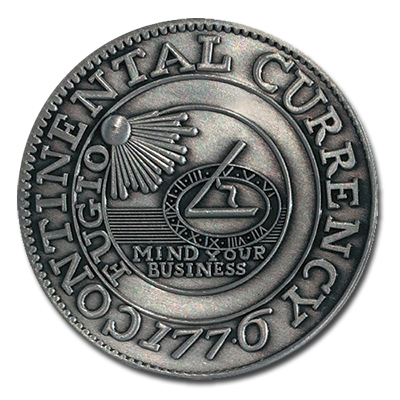About the 1776 Continental Dollar:
 In 1776 the Continental Congress—eager to exert its sovereign status in the newborn America—set out to produce a coin to replace the commonly used Spanish and British currency. Originally minted in tin, pewter, silver, and brass, it is believed to have been based on a design by Benjamin Franklin. The front of these coins bears a striking motto that captures the independent spirits of the founding patriots: “Mind Your Business.”
In 1776 the Continental Congress—eager to exert its sovereign status in the newborn America—set out to produce a coin to replace the commonly used Spanish and British currency. Originally minted in tin, pewter, silver, and brass, it is believed to have been based on a design by Benjamin Franklin. The front of these coins bears a striking motto that captures the independent spirits of the founding patriots: “Mind Your Business.”
Franklin’s coin, most commonly referred to as the “Continental Dollar,” features a picture of the sun, its rays beating down onto a sun dial, next to the word “Fugio”—Latin for “I flee.” Together with the caption, this implies, “Time flies, so mind your business.” At the time, “business” was understood literally as business, or commerce, particularly in the context of currency. But with his well-known love for witty maxims, Franklin likely intended a double meaning. The second sense of “mind your business” would have been closer to how we understand it today: be responsible for yourself, and don’t needlessly meddle in others’ affairs.
As the Continental Congress churned out paper currency to pay its bills, that currency was quickly devalued until it was worthless. Soon, “not worth a continental” became a popular expression. But in 1787, Congress decided to resurrect Franklin’s design for the first official United States penny—a copper coin now known as the “Fugio Cent.”
Two men competed for the contract to produce those coins. One of them, James Jarvis, nabbed the contract by sending a $10,000 bribe to William Durer, the head of the Treasury Board—and an old family friend.
The government lent Jarvis 30 tons of copper to begin coining, presuming that he would eventually pay them back. Instead, Jarvis and his father-in-law proceeded to make only a fraction of the currency they had been contracted to provide and used the remaining copper to produce a lighter type of coin—thus upping their profits. When Congress realized they had been swindled, Jarvis and his accomplices fled for Europe. The Fugio Cent saw very little circulation, as copper was devalued shortly thereafter and the pennies, along with the Continental Dollar, became very scarce.
Alas, merely espousing the principles of liberty is not enough: they have to be vigilantly guarded from corrupt politicians and cronies ever on the lookout for ways to abuse government power for their own gains. The Founding Fathers knew this well, as we do today, based on the swelling government that is manipulated to their own ends by lobbyists, politicians, and special interests.
 In 1776 the Continental Congress—eager to exert its sovereign status in the newborn America—set out to produce a coin to replace the commonly used Spanish and British currency. Originally minted in tin, pewter, silver, and brass, it is believed to have been based on a design by Benjamin Franklin. The front of these coins bears a striking motto that captures the independent spirits of the founding patriots: “Mind Your Business.”
In 1776 the Continental Congress—eager to exert its sovereign status in the newborn America—set out to produce a coin to replace the commonly used Spanish and British currency. Originally minted in tin, pewter, silver, and brass, it is believed to have been based on a design by Benjamin Franklin. The front of these coins bears a striking motto that captures the independent spirits of the founding patriots: “Mind Your Business.”